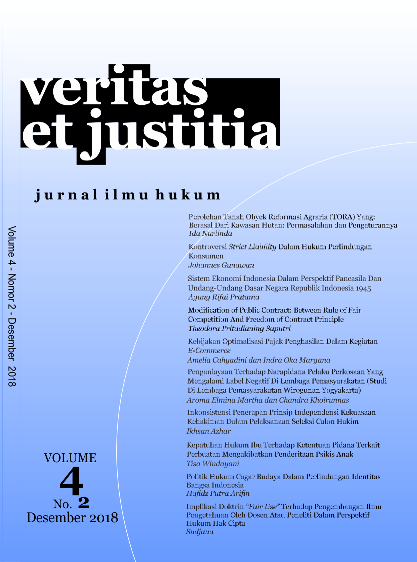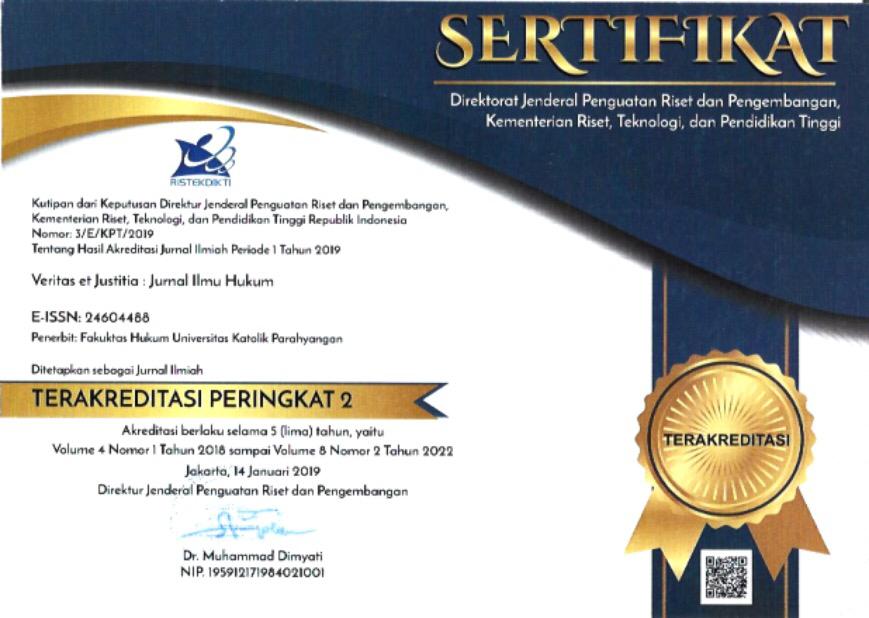SISTEM EKONOMI INDONESIA DALAM PERSPEKTIF PANCASILA DAN UUD 1945
DOI:
https://doi.org/10.25123/vej.v4i2.3067Abstract
The focus of this article, using a juridical normatif and philosophical approach, is in tracking how Article 33 of the Indonesian Constitution is understood and how the Pancasila economic system (based on the five tenets of the State’s ideology) is being implemented by a number of exisitng economic policies. While the Article should be regarded as the embedodiment of Indonesian economic policy, it cannot be denied that the understanding of it evolved and changed following the 4thamendment to the Constitution. It is observed that the 4thamendment to the 1945 Constitution have had a great impact on the direction taken by the Indonesian economic policy makers. In using a juridical normative approach we are forced to take the position that Pancasila economic system as found in the Constitution should be followed by the letter in real economic policy making. On the other hand, just to do that, we cannot but realize the need for the existence of government political will.References
Daftar Pustaka
Buku
Emil Salim, Sistem Ekonomi dan Ekonomi Indonesia, Lembaga Ekonomi dan Kemasjarakatan Nasional, Jakarta, 1965.
Emil Salim, “Politik dan Ekonomi Pantjasila”, Lembaga Ekonomi dan Kemasjarakatan Nasional, Jakarta, 1965.
Ermaya Suradinata, Undang-Undang Dasar 2002 Hasil Amandemen UUD 45 Menghancurkan Bangsa”, Yayasan Kepada Bangsaku, Jakarta, 2008.
Jimly Asshiddiqie, Gagasan Kedaulatan Rakyat dalam Konstitusi dan Pelaksanaannya di Indonesia, Ichtiar Baru-van Hoeve, Jakarta, 1994.
Jimly Asshiddiqie, The Constitutional Law of Indonesia, Sweet & Maxwell Asia, Selangor, 2009.
Jimly Asshiddiqie, Konstitusi Ekonomi, PT Kompas Media Nusantara, Jakarta, 2010.
Kelsen, Hans, Teori Hukum tentang Hukum dan Negara, Nusamedia dan Nuansa, Bandung, 2006.
Mochtar Kusumaatmadja, Pemantapan Cita Hukum dan Asas-Asas Hukum Nasional di Masa Kini dan Masa yang Akan Datang, Alumni, Bandung, 1995.
Mohammad Hatta, Ekonomi Terpimpin, Penerbit Jakarta, Jakarta, 1960.
Mohammad Hatta, Untuk Negeriku, Kompas, Jakarta, 2012.
Moh Kusnardi, Harmaily Ibrahim, Pengantar Hukum Tata Negara Indonesia, Sinar Bakti, Jakarta, 1983.
Paganetto, Luigi (ed.), The Political Economy of the European Constitution (Aldershot, Ashgate, 2007).
Philipus M. Hadjon, Perlindungan Hukum Bagi Rakyat di Indonesia, PT. Bina Ilmu, Surabaya, 1987.
Revrisond Baswir, Ekonomi Kerakyatan vs Neoliberalisme, Tim Ahli Pusat Studi Ekonomi Kerakyatan Universitas Gajah Mada, Yogyakarta, 2009.
Sri Soemantri M, Hukum Tata Negara Indonesia, PT Remaja Rosdakarya, Bandung, 2014.
Tom Gunadi, Ekonomi Pancasila Dalam Kancah Pendapat Ekonomi, Angkasa, Bandung, 1995.
Artikel/Karya Ilmiah
Hamid A. Attamimi, “Peranan Keputusan Presiden Republik Indonesia dalam Penyelenggaraan Pemerintahan Negara: Suatu Studi Analisis Mengenai Keputusan Presiden yang Berfungsi Pengaturan dalam Kurun Waktu Pelita I–Pelita IV”, Disertasi Ilmu Hukum Fakultas Pascasarjana Universitas Indonesia, Jakarta, 1990.
K., Wolfgang, “On the Concept of the ‘Economic Constitution’ and the Importance of Franz Bohn from the Viewpoint of Legal History”, European Journal of Law and Economics, Volume 3, Number 4, Springer, Desember 1996.
Policy Papers oleh Peneliti Muda WP II/III Theories: Team 5, EU-Consent, didukung oleh European Union’s 6th Framework Programme.
Himawan Indrajat, “Demokrasi Terpimpin Sebuah Konsepsi Pemikiran Soekarno Tentang Demokrasi”, Jurnal Sosiologi Vol. 18, No. 1: 53-62, Lampung, Hal. 53.
Peraturan Perundang-Undangan
Undang-Undang Dasar 1945, Amandemen Keempat Tahun 2002
Internet
Tarli Nugroho, “Ekonomi Pancasila Refleksi Setelah Tiga Dekade”, https://academia.edu/1500041/Ekonomi_Pancasila_Refleksi_setelah_Tiga_Dekade.
http://nobelprizes.com/nobel/economics/1986a/html.
http://ui.ac.id/berita/memahami-gagasan-ekonomi-kerakyatan-bunghatta.html
Downloads
Published
Issue
Section
License
Authors who publish with this journal agree to the following terms:
Authors retain copyright and grant the journal right of first publication with the work simultaneously licensed under a Creative Commons Attribution License that allows others to share the work with an acknowledgement of the work's authorship and initial publication in this journal.
Authors are able to enter into separate, additional contractual arrangements for the non-exclusive distribution of the journal's published version of the work (e.g., post it to an institutional repository or publish it in a book), with an acknowledgement of its initial publication in this journal.
Authors are permitted and encouraged to post their work online (e.g., in institutional repositories or on their website) prior to and during the submission process, as it can lead to productive exchanges, as well as earlier and greater citation of published work.
The Journal allow the author(s) to hold the copyright and to retian publishing rights without restrictions.










